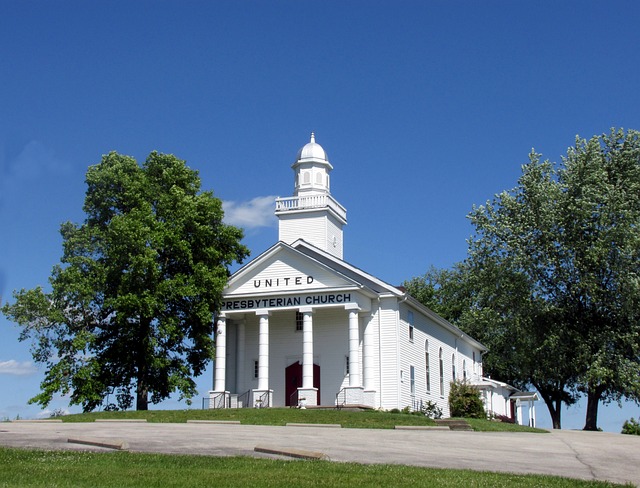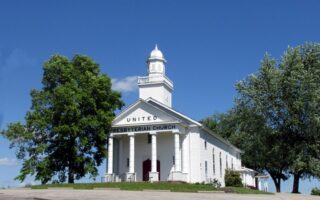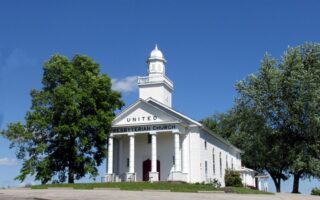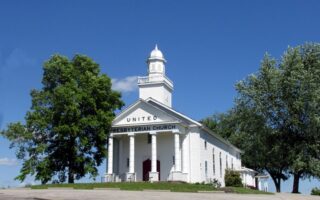Presbyterians are a Protestant Christian denomination that originated in Scotland during the 16th century. They are known for their unique form of church governance, which is characterized by a system of representative elders. Presbyterians place a strong emphasis on the authority of Scripture, the sovereignty of God, and the priesthood of all believers. They have a rich theological tradition and are known for their commitment to education, social justice, and missions.
Table of Contents
The History and Origins of Presbyterianism
Presbyterianism is a Christian denomination that has a rich history and a unique set of beliefs and practices. If you’ve ever wondered what the deal is with Presbyterians, then you’re in the right place! In this article, we’ll explore the history and origins of Presbyterianism, shedding light on this fascinating branch of Christianity.
Presbyterianism traces its roots back to the Protestant Reformation in the 16th century. It was during this time that a Scottish theologian named John Knox became a key figure in the development of Presbyterianism. Knox was greatly influenced by the teachings of John Calvin, a French theologian who played a significant role in the Reformation movement.
The term “Presbyterian” comes from the Greek word “presbyteros,” which means “elder.” This reflects one of the key aspects of Presbyterianism – its emphasis on the role of elders in the church. In Presbyterian churches, elders are elected by the congregation and serve as spiritual leaders and decision-makers.
One of the defining characteristics of Presbyterianism is its system of church governance. Presbyterian churches are organized into a hierarchy of governing bodies, with each level having authority over the one below it. At the local level, individual congregations are governed by a session, which consists of elders and the minister. At the regional level, groups of congregations form presbyteries, and at the national level, there are synods or general assemblies.
Presbyterians also have a distinctive approach to theology. They adhere to the principles of Calvinism, which emphasize the sovereignty of God, the authority of Scripture, and the doctrine of predestination. This means that Presbyterians believe that God is in control of all things and that salvation is predetermined by God’s grace.
In terms of worship, Presbyterian churches typically follow a liturgical format. This includes elements such as prayers, hymns, Scripture readings, and a sermon. The sacraments of baptism and the Lord’s Supper are also central to Presbyterian worship. Baptism is seen as a sign of initiation into the Christian faith, while the Lord’s Supper is a commemoration of Jesus’ last supper with his disciples.
Presbyterians are known for their commitment to education and intellectual inquiry. Many Presbyterian churches have a strong emphasis on education, with a long history of establishing schools and colleges. This commitment to education is rooted in the belief that knowledge and understanding are essential for a vibrant and informed faith.
Throughout history, Presbyterianism has spread beyond Scotland and has become a global movement. Today, there are Presbyterian churches in many countries around the world, including the United States, South Korea, and Nigeria. Each Presbyterian church may have its own unique traditions and practices, but they all share a common heritage and commitment to the principles of Presbyterianism.
In conclusion, Presbyterianism is a Christian denomination with a rich history and distinct set of beliefs and practices. Its origins can be traced back to the Protestant Reformation, and it is characterized by its emphasis on the role of elders, its system of church governance, and its adherence to Calvinist theology. Presbyterian worship is liturgical in nature, and education is highly valued within the tradition. With its global presence, Presbyterianism continues to be a significant force within the broader Christian community. So, now that you know a bit more about the deal with Presbyterians, you can appreciate the unique contributions they have made to the world of Christianity.
Key Beliefs and Doctrines of Presbyterians

Presbyterians, what’s the deal with them? If you’ve ever wondered about this Christian denomination, you’re not alone. With their distinctive name and presence in many communities, it’s natural to be curious about what they believe and how they practice their faith. In this article, we’ll explore the key beliefs and doctrines of Presbyterians, shedding light on their unique perspective within the broader Christian landscape.
At the heart of Presbyterianism is the belief in the sovereignty of God. Presbyterians emphasize that God is in control of all things and that everything happens according to His divine plan. This belief is rooted in the teachings of John Calvin, a prominent figure in the Protestant Reformation. Calvin’s ideas heavily influenced Presbyterian theology, shaping their understanding of God’s authority and the role of humanity in His plan.
Another central belief of Presbyterians is the concept of predestination. This doctrine asserts that before the creation of the world, God chose certain individuals to be saved and others to be damned. While this idea may seem controversial to some, Presbyterians see it as a testament to God’s grace and mercy. They believe that salvation is a gift from God, not something earned through good works or personal merit.
Presbyterians also place a strong emphasis on the Bible as the ultimate authority in matters of faith and practice. They believe that the Scriptures are inspired by God and provide guidance for all aspects of life. This commitment to the Bible is reflected in their worship services, where the reading and preaching of Scripture play a central role. Presbyterians strive to interpret the Bible faithfully, seeking to understand its message in its historical and cultural context.
In terms of church governance, Presbyterians have a unique system that sets them apart from other Christian denominations. They practice a form of church government known as Presbyterian polity. This means that decisions within the church are made collectively by a group of elders, known as the session. The session is responsible for the spiritual oversight and governance of the local congregation. At a broader level, Presbyterians are also organized into regional bodies called presbyteries, which provide support and accountability to individual churches.
When it comes to sacraments, Presbyterians recognize two: baptism and the Lord’s Supper. Baptism is seen as a sign and seal of God’s covenant with His people, symbolizing the washing away of sin and the new life found in Christ. The Lord’s Supper, also known as communion, is a commemoration of Jesus’ last supper with His disciples. Presbyterians believe that in partaking of the bread and wine, they are spiritually nourished and united with Christ and His church.
In summary, Presbyterians have a distinct set of beliefs and doctrines that shape their understanding of God, salvation, and the Christian life. They emphasize the sovereignty of God, predestination, the authority of the Bible, and the importance of collective decision-making in church governance. Through their sacraments of baptism and the Lord’s Supper, Presbyterians seek to express their faith and draw closer to God. So, the next time you encounter a Presbyterian, you’ll have a better understanding of what makes them tick.
Presbyterian Church Governance and Structure
Presbyterian Church Governance and Structure
So, you’ve heard the term “Presbyterian” thrown around, but what does it actually mean? What is the deal with Presbyterians? Well, let’s dive into the world of Presbyterian Church governance and structure to find out.
First things first, the Presbyterian Church is a Protestant Christian denomination that traces its roots back to the Reformation in the 16th century. The name “Presbyterian” comes from the Greek word “presbyteros,” which means “elder.” This is a key concept in understanding the structure of the Presbyterian Church.
Unlike some other Christian denominations, the Presbyterian Church is governed by a system of elders. These elders, also known as presbyters, are elected by the congregation and serve as leaders within the church. They are responsible for making decisions and providing spiritual guidance.
But it’s not just a free-for-all with a bunch of elders running the show. The Presbyterian Church has a hierarchical structure that ensures accountability and unity. At the local level, individual congregations are governed by a session, which is made up of elders elected by the congregation. The session is responsible for the day-to-day operations of the church and making decisions on behalf of the congregation.
Moving up the ladder, multiple congregations within a specific geographic area are grouped together into a presbytery. The presbytery is made up of representatives from each congregation, including both ministers and elders. The presbytery provides oversight and support to the individual congregations within its jurisdiction.
Above the presbytery is the synod, which is a regional governing body that oversees multiple presbyteries. The synod ensures that the presbyteries are functioning properly and provides resources and support to the congregations within its region.
Finally, at the top of the hierarchy is the General Assembly. This is the highest governing body of the Presbyterian Church and is made up of representatives from each presbytery. The General Assembly meets annually to make decisions on behalf of the entire denomination, including matters of doctrine, worship, and church governance.
This hierarchical structure ensures that decisions are made collectively and that there is accountability within the Presbyterian Church. It also allows for a sense of unity and connection among individual congregations, as they are part of a larger body.
Another important aspect of Presbyterian Church governance is the role of ministers. Ministers are ordained individuals who have received theological training and are responsible for leading worship, providing pastoral care, and teaching the congregation. They are also members of the presbytery and have a voice in the decision-making process.
Overall, the Presbyterian Church governance and structure is designed to promote collaboration, accountability, and unity within the denomination. It allows for the participation of both clergy and laity in decision-making and ensures that the church is guided by a collective wisdom.
So, the next time you hear someone mention Presbyterians, you’ll have a better understanding of what they’re talking about. It’s not just a random term, but a denomination with a unique system of governance and structure that sets it apart.
Understanding the Role of Worship and Sacraments in Presbyterianism
Presbyterianism is a branch of Protestant Christianity that has its roots in the Reformation movement of the 16th century. It is a denomination that is known for its emphasis on the role of worship and sacraments in the life of its members. In this article, we will explore the significance of worship and sacraments in Presbyterianism and how they shape the beliefs and practices of its followers.
Worship plays a central role in the life of a Presbyterian. It is seen as a time of communal gathering where believers come together to praise and worship God. The Presbyterian worship service typically includes elements such as prayers, hymns, scripture readings, and a sermon. These elements are carefully chosen to create a meaningful and transformative experience for the worshipers.
One of the distinctive features of Presbyterian worship is the use of the Book of Common Worship. This book contains a collection of prayers, liturgies, and orders of worship that guide the congregation through the service. It provides a framework for worship that is rooted in tradition but also allows for flexibility and creativity. This balance between tradition and innovation is a hallmark of Presbyterian worship.
Another important aspect of worship in Presbyterianism is the sacraments. Sacraments are visible signs of God’s grace and presence in the world. In the Presbyterian tradition, there are two sacraments: baptism and the Lord’s Supper. Baptism is seen as a symbol of initiation into the Christian community, while the Lord’s Supper, also known as communion, is a commemoration of Jesus’ last supper with his disciples.
The sacraments are not just symbolic rituals in Presbyterianism; they are seen as means of grace. Through baptism, believers are united with Christ and become part of his body, the church. Through communion, believers are nourished and strengthened in their faith. The sacraments are seen as tangible expressions of God’s love and forgiveness, and they play a vital role in the spiritual life of a Presbyterian.
In addition to worship and sacraments, Presbyterianism also places a strong emphasis on the authority of scripture. The Bible is seen as the inspired word of God and the ultimate authority for faith and practice. It is through the study and interpretation of scripture that Presbyterians seek to understand God’s will and live out their faith.
The role of worship and sacraments in Presbyterianism is not just limited to the church building. It extends into the daily lives of its members. Presbyterians are encouraged to live out their faith in all aspects of their lives, seeking to embody the values and teachings of Jesus Christ. Worship and sacraments are seen as a means of equipping believers for this task, providing them with the spiritual nourishment and guidance they need to live as faithful disciples.
In conclusion, worship and sacraments play a vital role in Presbyterianism. They are not just rituals or traditions; they are a means of encountering God’s presence and grace. Through worship, Presbyterians come together as a community to praise and worship God. Through the sacraments, they experience God’s love and forgiveness in a tangible way. These practices shape the beliefs and practices of Presbyterians, guiding them in their journey of faith and equipping them to live as faithful disciples in the world.
Conclusion
In conclusion, Presbyterians are a Protestant Christian denomination that originated in Scotland during the 16th century. They follow a form of church governance known as Presbyterianism, which emphasizes the authority of elected elders in decision-making. Presbyterians place a strong emphasis on the sovereignty of God, the authority of Scripture, and the importance of education and intellectual inquiry. They have diverse theological beliefs and practices, but generally prioritize the worship of God, community involvement, and social justice.


